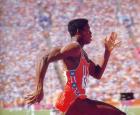100 meter race. The fastest man in the world. Usain's success story
These celebrities have made their mark in sports history as the fastest athletes in the 100 meters.
We present to you a selection of videos with finishing times ranging from 9.77 to the current world record of 9.58.
Powell Asafa - 9,77
Powell Asafa is a Jamaican sprinter, 2008 Olympic champion and 2009 world champion in the 4x100 m relay. Former world record holder in the 100 meters. His personal best is 9.72 seconds, which makes him the fourth fastest sprinter in history at this distance (only Usain Bolt, Yohan Blake and Tyson Gay ran faster).
Yohan Blake - 9.76
Yohan Blake is a Jamaican athlete and sprinter. Olympic champion 2012 in the 4x100 m relay, twice Olympic silver medalist - at distances of 100 and 200 m, world champion 2011 in the 100 meters and 4x100 meters relay. World Junior Champion 2006 in the 4x100 meter relay. World record holder in the 4x100 meter relay as part of the Jamaican team (36.84 seconds, London 2012). He is ranked 3rd on the list of the fastest 100m runners of all time. He is the youngest sprinter to break the 10-second barrier in the 100-meter dash (aged 19 years, 196 days).
Tyson Gay - 9,75
Tyson Gay- American track and field sprinter. The main athletics events are the 100 and 200 meters. Personal bests make Tyson Gay the second fastest sprinter on the planet in the 100m and sixth fastest in the 200m.
Justin Gatlin - 9,74
Justin Gatlin - American sprinter, 2004 Olympic champion and 4-time world champion, who returned to the sport after a four-year disqualification for doping. Thanks to his personal bests, he is the fifth fastest sprinter in the world in both the 100 and 200 meters.
Powell Asafa - 9.72
Tyson Gay - 9.69
Usain Bolt - 9.63
Usain Bolt is a Jamaican athlete who specializes in short-distance running, an eight-time Olympic champion and an 11-time world champion (a record in the history of these competitions). During his performances he set 8 world records. World record holder in the 100m dash - 9.58; and 200 meters - 19.19, as well as in the 4x100 meter relay as part of the Jamaican team - 36.84. The fastest sprinter in history at distances of 100 and 200 meters.
He is the only athlete who managed to win the sprint distances of 100 and 200 meters at three Olympics in a row (Beijing 2008, London 2012 and Rio de Janeiro 2016). Winner of the most Olympic gold medals in Jamaican sports history. Currently shares third place in the number of gold medals won at the Olympic Games among track and field athletes. The first person in history to win 11 gold medals at the world championships. Commander of the Jamaican Order of Dignity (2008) and Companion of the Order of Jamaica (2009). For his name and high running speed he received the nickname “Lightning Bolt”.
Usain Bolt 9.58
In the 100-meter final of the Beijing Olympics, Bolt recorded a peak speed of 12.2 m/s (43.9 km/h) and an average stride length of 2.6 meters. He needed to take 41 steps, while other sprinters, particularly Asafa Powell and Tyson Gay, need 2-2.5 steps more. On August 16, 2009, at the finals of the World Championships in Berlin, he set a world record in the 100 meters - 9.58. The very next day, detailed data on the record race were published on the IAAF website. According to them, the Jamaican sprinter covered the distance from 60 to 80 meters in 1.61 seconds. The highest average speed was recorded on this segment - 12.42 m/s (44.72 km/h).
A person's running speed is another characteristic by which competitions can be held. Today there are such concepts as average running speed, maximum and record.
Running speed of an ordinary person
The most ordinary healthy person, who has no contraindications to fast running, can show his speed data at a sprint distance of 100 meters.
After the race your legs will hurt, this is natural. Typically, the time it takes such an unprepared person to run a hundred meters ranges from 13 to 15 seconds.
Of course, people who are overweight, elderly, or have underlying health conditions can show significantly poorer results. And not everyone who walks normally can run.
A healthy person noticeably improves his performance after a month of training. Its time can be as long as 11.5-12 seconds (we are talking about an adult). Further, if you practice steadily and diligently, this time will gradually decrease by tenths, then by hundredths of a second. What if you become a new world record holder?
Maximum speed
The maximum running speed will vary depending on the discipline in which the athlete is participating. That is, athletes and runners show different speeds at different distances. The longer the marathon and the greater the distance, the lower the maximum speed will be.
Maximum loads very quickly deplete our body's reserves. And if a marathon runner takes off at the very beginning of the race, then he is unlikely to have enough strength to complete the competition.
This is why athletes who can run quite fast run long distances much slower than we might think.
It is more correct to talk about maximum speeds at sprint distances. About medium - on long.
The maximum possible (record) human speed today is 44.7 km/h. It was shown by the record holder for 100 and 200 meters running, Usain Bolt - the fastest man in the world.
Previously, several times during the 20th century, different runners entered the record books, but Bolt pushed them aside. Perhaps this is due to the system for recording results - after all, today is the age of electronic technology.
Bolt's record at a distance of 100 meters is 9.58 seconds, and 200 - 19.19 seconds.
Average running speed
This indicator can be used to compare the speed characteristics of long-distance runners. Although it is much more convenient to talk about the time during which the distance is covered.
Men who have the first adult category in running show the following results:
- 10 km – 18.5 km/h.
- 42.2 km – 16.1 km/h.
Masters of sports of international class show results that are 3 km/h higher than the above.
By the way, the average sprint speed of Usain Bolt is 37 km/h at a distance of 100 meters. Let me remind you that the fastest sprint run belongs to him.
The fastest speed over a distance of 42.2 km in 2013 was shown by Wilson Kipsang, who accelerated sharply after 35 km, running at this pace until the finish. Apparently, the athlete found a good way to save energy. His result is 2 hours 3 minutes and 23 seconds, a total of 7403 seconds. Accordingly, his average speed at a distance of 42.2 was 20.5 km/h, which is 1 km/h higher than that of an international-class master of sports.
What determines running characteristics?
The average running speed of a person depends on his physical capabilities: state of health, physiological characteristics, and level of training.
Diseases and injuries
Past illnesses have a negative impact on speed performance. For example, fractures, injuries, operations leave their mark. The more serious the health problem, the slower the running.
By the way, when running, depending on its speed, various processes occur in the body. That is, fast and slow running affects our health differently. High speed is needed for records, and slow running is called healthy.
Fast running is prohibited for people who have had a myocardial infarction. And even the healthiest people in this category face one physiological difficulty. The heart partially loses its main ability - to effectively pump blood. For those who have suffered a heart attack, it is best to engage in recreational slow running or jogging after rehabilitation.
Lung problems also negatively affect speed, reducing the rate of oxygen absorption by the body.
Limb length
Most people think that long legs are the key to high speeds. After all, the step becomes wider and fewer steps need to be taken. If you look at the new record holder, Bolt, you can be convinced of this. His height is 195 cm, and his weight is 95 kg. Despite his large size, he turned out to be faster than all other athletes. Who knows, maybe soon a champion with a height of more than 2 meters will appear.
Over long distances, height is not so critical. Although it seems logical: the higher the height, the more resistance the air has while running. Wilson Kipsang has a height of 1.82 meters. This is also a lot, however, Wilson is the record holder at a distance of 42.2 km.
Athlete weight
Heavy weight only matters if it is overweight. Physiologically, sprinters are somewhat heavier than marathon runners. The former have more pronounced muscles, because it is this that allows them to develop maximum effort in a short time. The latter are aimed at endurance, and every additional kilogram will significantly complicate the completion of a long distance.
In the case of Bolt, his 95 kg does not in any way prevent him from being the fastest in the world, because this is his physiological norm. But he doesn't run marathons.
Wilson Kipsang is slightly taller than average, but weighs only 62 kg. This is understandable; long runs do not allow him to gain mass. At long distances, gravity becomes a significant enemy. The less a marathon runner weighs, the faster and easier he will run the distance.
We conclude that for greater speed, sprinters need to be strong and long-legged. And marathon runners are light and resilient.
Genetics
Genetics decides a lot in our body. Metabolic rate, speed, anaerobic threshold and aerobic endurance, body susceptibility to training. All these parameters will determine your speed ceiling.
Records in the men's 200 meters have been held by the IAAF since 1951. Until 1976, separate records were recorded for a straight track and a track with a turn. Since in the 1970s, at all significant competitions, the 200 m race was held according to... ... Wikipedia
This table shows world records at a distance of 3000 meters. The first world record was ratified by the IAAF in 1912. Results that were shown before 1912 are also presented. Chronology of records until 1912 Time Athlete Date ... Wikipedia
This table shows world records at a distance of 5000 meters. The first world record was ratified by the IAAF in 1912. Results that were shown before 1912 are also presented. Chronology of records World records for men on... ... Wikipedia
Contents 1 History 2 Manual stopwatch (1900–1976) 3 Electronic stopwatch (since 1976) ... Wikipedia
The first world record in the 100 meters for a woman was recorded by the International Women's Sports Federation (Fédération Sportive Féminine Internationale, FSFI) in 1922. In 1936, the FSFI became part of the IAAF. As of September 20, 2012... ... Wikipedia
Contents 1 Manual stopwatch (1966 1976) 2 Electronic stopwatch (since 1975) 3 See also... Wikipedia
The first world record for the 1 mile was ratified by the IAAF in 1913. Until 21 June 2009, the IAAF had ratified 32 world records for this distance. Contents 1 Chronology of world records ... Wikipedia
The first world record in the 200 meters for a woman was recorded by the International Women's Sports Federation (Fédération Sportive Féminine Internationale, FSFI) in 1922. In 1936, the FSFI became part of the IAAF. Until 1951, the IAAF did not... ... Wikipedia
The table shows the chronology of world records in the men's 110-meter hurdles. The first world record was recorded by the International Amateur Athletics Federation (now IAAF) in 1912. the first record holder was... ... Wikipedia
This list provides a chronology of men's 1500m world records. All results are ratified by the International Association of Athletics Federations. 1500 meters is one of the most popular athletics distances.... ... Wikipedia
The ancient Greeks gave one recipe for all ailments and bad moods - running! Among animals, the best sprinter is the cheetah; it can reach speeds of over 100 km per hour, but can maintain it for a matter of seconds. An ostrich can run through the desert for an hour at a speed of 60 km per hour. But since we belong to the human species, we are primarily interested in which of the people can run the fastest.
100 meters is the best distance
There are many distances in running, up to the marathon (42 km 195 meters), and other types... But only one of them captivates everyone on the planet, and not only fans of the queen of sports - athletics. This is a 100 meter run. The evolution of this distance, in fact, knows no beginning, and there will be no limit to it. Now not only athletes, but also a whole chain of people are working on improving speed at this distance - from medical institutes to bookmakers. After all, this is the most prestigious discipline in athletics.
Let's briefly consider the gradation of growth in results from the time of the first modern Olympics in Athens in 1896 to the present day. Considering that until 1975 the results were recorded with a hand-held stopwatch, they will not be as accurate as they are now.
First records among men
At the first Olympics in Athens, the result of the winner Thomas Burke from the USA in the 100 meters was only 12 seconds exactly, which in our time is accessible even to beginning school-age athletes. But then the Olympics really had a motto: “The main thing is not victory, but participation.”
But the prestige of the distance and the title of the fastest man on the planet makes us chase the long-awaited victory at this distance. And sixteen years later, in 1912 in Stockholm, Donald Lippincott from the same United States of America sets a world record at a distance of 100 meters - 10.6 seconds.
Later, athletes trimmed hundredths and tenths to overcome the ten-second mark, and the first to run the 100-meter distance in 10 seconds was Armin Hari from Germany in Zurich in 1960. Now everyone was waiting impatiently, who would trade ten seconds in the 100-meter dash? It took exactly eight years. In 1968, American athlete Jim Hines was the first in the world to reach this ten-second mark. He covered 100 meters and set a world record, running the distance in 9.9 seconds. Jim Hines won the 100-meter dash at the Mexico City Olympics that same year, running in 9.5 seconds.
World records in the 100m dash in the nineties
Then came the eighties and nineties. Here the leadership was shared by athletes from Canada and the USA. The legendary breakthrough in this discipline, in 1988 at the Seoul Olympics, with a result unthinkable at that time - 9.79 seconds - took everyone by surprise, but due to the discovery of doping, the athlete was disqualified, and the medal was given to the legendary from the USA, who completed the distance in 9.92 seconds. Over time, the athlete improved his performance at the 1991 World Championships (Tokyo) to 9.86 seconds in the 100-meter dash. The world record has reached a new mark.

The result of 9.8 seconds was the first, and so far the last from the USA, to cover the distance in 9.79 seconds. His compatriots made attempts to improve their results in the 100-meter dash. Tim Montgomery 9.78 sec. and 9.77 seconds by Justin Getlin, but due to positive doping tests, their world results were canceled. Later, athletes from Jamaica entered the arena, and to this day their world records remain open and deserve respect.
Usain Bolt holds the 100m record

From 2005 to 2007, he repeated his own world record three times - 9.77 seconds. - and brought the result to 9.74 seconds. at the championship in Rieti. Young and so far invincible in this discipline, the lightning man, as his fans nicknamed him, Usain Bolt from Jamaica in New York in 2008 sets his first world record for 100 meters (men) - 9.72 seconds. All this happened in front of local residents - athletes from the USA, who to this day cannot overtake the legend of Jamaican athletics.
Moving on in incredible seconds at the 2008 Beijing Olympics, he broke the mark - 9.69 seconds - and in 2009 beat his own 100m time. The world record of 9.58 seconds, set by a Jamaican athlete, cannot be broken to this day. Usain Bolt gave this gift to himself 5 days before his 24th birthday.
The athlete who was the only white-skinned athlete to win the 100- and 200-meter sprint events at the 1972 Munich Olympics deserves respect.
100 meter run. World Record: Women

For the fair half of humanity, world records were first recorded using a hand-held stopwatch at competitions in Prague in 1922, where an athlete from Czechoslovakia, Maria Meizlikova, showed a result of 13.6 seconds. In the same year, in Paris, her record was broken by the British Mary Lines, who ran in 12.8 seconds.
Electronic timing began to track women's records in this discipline, starting with the 1968 Mexico City Olympics. Then Wyomia Tyes from the USA became the champion with a result of 11.08 seconds. The first to exchange 11 seconds was an athlete from the GDR, Marlies Olsner, who ran in 10.88 seconds. (Dresden, 1977). Evelyn Ashforth from the USA brought the world record to 10.79 seconds, and later to 10.76 seconds. The milestone in the world achievement of the women's 100-meter dash was set by the American Florence Griffith-Joyner in Indianapolis in 1988 with a result of 10.49 seconds. This women's world record remains unbroken to this day.
Many people are interested in various sports and records. Now let's talk about a sport like running, namely the hundred-meter run. It is an Olympic sport. The hundred meter distance has produced many records that have changed over the years or have never been broken. Running is a discipline of athletics and has been present in them since the beginning of the Olympic Games.
Until 1966, time was measured regular mechanical stopwatch, but after these Olympic Games they began to use electronic stopwatches, which measured time to the thousandth of a second, but then still rounded to hundredths.
World record in 100 meters
 The first record holder to achieve success in running, it was Donald Lippincott At the Olympics in Stockholm in 1912, he set a record by running the distance in 10.6 seconds. In the same year, the world athletics association was created. But before that, the Olympic Games had already been held, but the association had not yet been created, so the achievements were not recorded. Therefore, it is worth noting the first two athletes whose records were not recorded.
The first record holder to achieve success in running, it was Donald Lippincott At the Olympics in Stockholm in 1912, he set a record by running the distance in 10.6 seconds. In the same year, the world athletics association was created. But before that, the Olympic Games had already been held, but the association had not yet been created, so the achievements were not recorded. Therefore, it is worth noting the first two athletes whose records were not recorded.
And the very first record-breaking athlete was Thomas Burke, running the distance in 12 seconds in 1896 at the first Olympic Games. At the next Olympic Games, this record was broken by the South African athlete Reginalt Walker, who won gold at the 1908 Games and set a new record of 10.80. Thus the barrier of 12 seconds was passed.
The next achievement was the 100-meter race among men, which is the longest in the history of athletics, lasting twenty years. The athlete who set this record is an American, his name is Jesse Owens and there was an interesting story connected with it. He set this record in 1936 at the Olympic Games in Berlin, which was 10.2 seconds.
Adolf Hitler hated Jews and blacks, believed the Aryan race was perfect, and that they would win in all disciplines. But he was disappointed when African Americans won many medals, and what he least wanted happened. He had to present the medals and during the presentation he did not shake hands and showed maximum disgust for the athletes.
This record lasted twenty years and was broken in 1956, also by an American athlete, his name was Willie Williams, who improved it by just one second, running the distance in 10.1 seconds. Then the running time for men changed every Olympic Games.
And the next world success in the 100-meter race among men, which has lasted for eight years, belongs to an athlete from Jamaica Usain Bolt nicknamed "lightning". He ran this distance in 9.58 seconds. So far, no one has ever compared to the success of Usain Bolt.
Usain Bolt is a unique athlete and it’s not for nothing that he bears the nickname “lightning.” After he set the world record for running 100 meters, scientists began to study him. They carried out body tests and other measurements of physical indicators and concluded that Usain had made a biological and physical leap, since according to the calculated schedules, the athletes were supposed to show such a result only in 2039. This is truly a phenomenon, so we expect new successes from Usain Bolt.
Some achievements of the athlete:
- 8-time Olympic champion.
- 11-time World Champion.
- Lots of records.
The approximate speed at which the athlete runs is 43 kilometers. An important event was when Jim Hines broke the 10 second mark. It was already clear that over time there would be great achievements like we have now.
World records for women's 100 meters
But we shouldn’t forget about women, who also have achievements worthy of attention. The first achievement in running a hundred meters was Czechoslovakian athlete Maria Meizlikova. She ran this distance in 13.6 seconds, which is not bad for the first success and the difference between the men was small. The main rivalry in the 100-meter dash was between the United States and Germany, with them competing for medals and records at almost every game.

Results
Running is a great way to get your body in order. Sprinting and long-distance running strengthens the musculoskeletal system, improves blood circulation, speeds up metabolism, which helps burn extra calories. If you want to get your body and body in order, you can take up interval running.







 What is compression clothing
What is compression clothing Cyclones and anticyclones Flettner's wind ship
Cyclones and anticyclones Flettner's wind ship Fastest man in the world
Fastest man in the world Descenders for industrial mountaineering Unicender - created by the Anglo-American company Morgan&Thompson
Descenders for industrial mountaineering Unicender - created by the Anglo-American company Morgan&Thompson